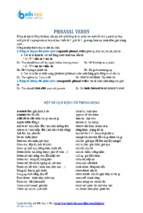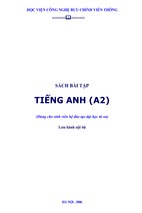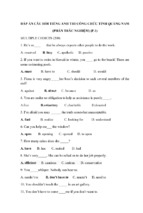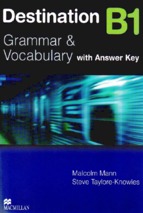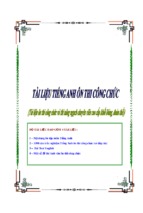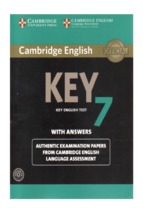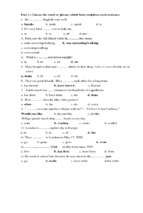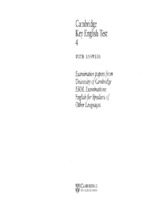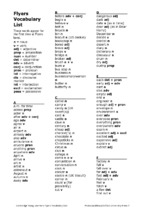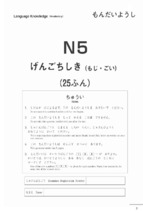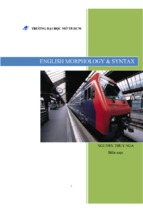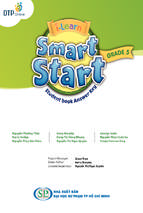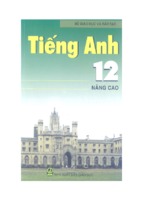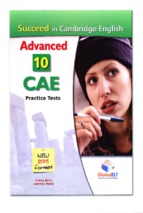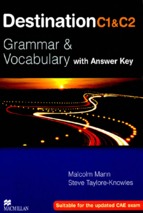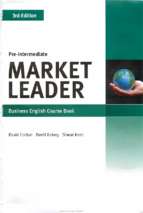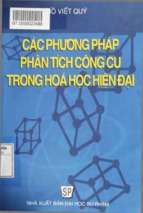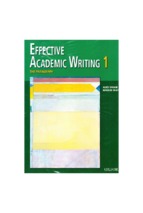HUNG VUONG UNIVERSITY
FOREIGN LANGUAGE DEPARTMENT
-----[\ [\-----
LE NGOC MAI
APPLYING EXTRACURRICULAR ACTIVITIES TO ENHANCE
LANGUAGE COMPETENCE OF STUDENTS GRADE 10B
AT HUNG VUONG HIGH - QUALITY SCHOOL
B.A. GRADUATION PAPER
FIELD: ENGLISH METHODOLOGY
Phu Tho, 2020
HUNG VUONG UNIVERSITY
FOREIGN LANGUAGE DEPARTMENT
-----[\ [\-----
LE NGOC MAI
APPLYING EXTRACURRICULAR ACTIVITIES TO ENHANCE
LANGUAGE COMPETENCE OF STUDENTS GRADE 10B
AT HUNG VUONG HIGH - QUALITY SCHOOL
(È3�'ӨNG MӜT SӔ HOҤ7�ĈӜNG NGOҤ,�.+Ï$�Ĉӆ 1Æ1*�&$2�
1Ă1*�/Ӵ&�1*Ð1�1*Ӳ CӪA HӐC SINH LӞP 10B TҤ,�75ѬӠNG
TRUNG HӐC PHӘ 7+Ð1*�&+Ҩ7�/ѬӦ1*�&$2�+Ô1*�9ѬѪ1*
Tӌ1+�3+Ò�7+Ӑ)
B.A. GRADUATION PAPER
FIELD: ENGLISH METHODOLOGY
SUPERVISOR: DAO THI THUY HUONG, M.A
Phu Tho, 2020
i
ACKNOWLEDGEMENT
I would like to express my sincere gratitude and appreciation to a number of
people, without whose support, this graduation paper would not have been
completed.
First and foremost, I would like to express my deepest thanks to my
supervisor Dao Thi Thuy Huong, M.A. for the wholehearted guidance she gave
me while I was doing this research. I am truly grateful to her for her ideas.
comments and instructions, as well as her constant support throughout my
research.
Secondly, I would like to thank all the lecturers, teachers and staff at Hung
Vuong University, especially those in Department of Foreign languages who have
created favorable conditions for me to study and write graduation paper.
Thirdly, my sincere thanks go to all teachers and students in Hung Vuong
High ± Quality School whose endless enthusiasm has helped me to carry surveys
which are very useful for my thesis.
Last but not least, I would like to show my gratitude to my family, my
friends for their spiritual, emotional and financial support and for giving me the
optimism to continue my learning.
Phu Tho, May 2020
Le Ngoc Mai
ii
ABSTRACT
In the upper-secondary schools in Vietnam, with the innovation of textbook
for 10th form students in light of Communicative Approach, the teaching of the
four skills has been much more focused on. So far, the English teaching methods
have been on the way to perfect. However, speaking is a crucial skill that the
teachers of English experience a lot of difficulties... In order to improve the quality
of speaking, the thesis limits itself to the study on using role-play activities to
improve speaking skills for grade 10th. This study is to bring some effectiveness
to the process of speaking in the classroom.
The study has been conducted for the purpose of testing the effectiveness
of using extracurricular activities to improve speaking skill of grade 10th students
at Hung Vuong High ± Quality School, PhuTho Province. Thus, two sets of survey
TXHVWLRQQDLUHV� DUH� XVHG� WR� LQYHVWLJDWH� VWXGHQW¶V� DWWLWXGHV�� SHUVSHFWLYHV� WRZDUG�
speaking skills and extracurricular activities adapted during speaking lessons, to
ILQG�RXW�WKH�WHDFKHUV¶�GLIILFXOWLHV�IRU�FDUU\LQJ�RXW�WKLV�WHFKQLTXH�
It is hoped that the thesis will make a small contribution to the improvement of
learning and teaching speaking skill.
iii
TABLE OF CONTENT
PART A: INTRODUCTION ................................................................................ 1
1. Rationale............................................................................................................ 1
2. Previous research............................................................................................... 2
2.1 In the world ..................................................................................................... 2
2.2 In Viet Nam ..................................................................................................... 7
3. Research purposes ........................................................................................... 10
4. Research questions .......................................................................................... 10
5. Methodology: .................................................................................................. 10
6. Data collection instruments: ............................................................................ 11
7. Participants ...................................................................................................... 11
8. Significance of the research ............................................................................ 11
9. Research scope ................................................................................................ 11
10. Outline of the study ....................................................................................... 11
PART B: CONTENT .......................................................................................... 13
CHAPTER 1: THEORETICAL BACKGROUND........................................ 13
1.1 Literature review ........................................................................................... 13
1.1.1 Speaking skills............................................................................................ 13
1.1.2: Extracurricular activities ........................................................................... 20
1.1.3: Advantages and Disadvantages of using extra ± activities ....................... 26
1.1.4 Some extracurricular activities to enhance English speaking skills for
student ................................................................................................................. 30
CHAPTER 2: METHODOLOGY ................................................................... 44
2.1. Research setting: .......................................................................................... 44
2.2. Subject of the research ................................................................................. 44
2.3. Participants of the research .......................................................................... 44
2.4. Data collection instruments .......................................................................... 45
2.4.1 Survey questionnaires ................................................................................ 45
2.4.2 Interview..................................................................................................... 46
iv
2.4.3 Observation ................................................................................................ 46
2.5. Research procedure ...................................................................................... 47
2.6. Data analysis ................................................................................................ 48
CHAPTER 3: THE CURRENT SITUATIONS IN TEACHING AND
LEARNING ENGLISH SPEAKING AT HUNG VUONG HIGH QUALITY
HIGH SCHOOL ................................................................................................ 49
3.1 Result from questionnaires ............................................................................ 49
3.2 Result from interview .................................................................................... 52
3.3 Result from observation ................................................................................ 53
CHAPTER 4: EXPERIMENT ............................................................................ 55
4.1 Experiment .................................................................................................... 55
4.1.1 Description of the experimental teaching .................................................. 55
������5HVXOW�IURP�VWXGHQWV¶�TXHVWLRQQDLUH�DIWHU�WKH�H[SHULPHQW ......................... 57
4.2. Findings and discussion ............................................................................... 61
4.3. Implications .................................................................................................. 63
4.3.1. For teacher ................................................................................................. 63
4.3.2. For students ............................................................................................... 64
PART C: CONCLUSION ................................................................................... 66
1. Summary ......................................................................................................... 66
2. Limitations of the study .................................................................................. 67
3.Suggestions for the future study ....................................................................... 68
REFERENCES .................................................................................................... 69
APPENDIX 1:
v
LIST OF TABLES
Table 3.1. Data collected from survey questionnaire before experiment ........... 49
LIST OF FIGURES
Figure 4.1.1. The level of the usefulness of extracurricular activities ..................... 57
)LJXUH��������6WXGHQWV¶�HYDOXDWLRQ�RI�WKH�HIIHFWLYHQHVV�RI�extracurricular activities . 58
Figure 4.1.3. The improvement of students after using extracurricular activities... 59
)LJXUH��������6WXGHQWV¶�GLIILFXOWLHV�LQ�XVLQJ�H[WUDFXUULFXODU�DFWLYLWLHV ..................... 60
vi
LIST OF ABBREVIATIONS
CLT
Communicative language teaching
EFL
English as a foreign language
ELT
English Language Teaching
ESL
English as a second language
1
PART A: INTRODUCTION
1. Rationale
Nowadays, English has become very popular language around the world.
There are more than 700 million English users in the world which is a terrible
number to prove the importance of English. According to the recent research
conducted in America last January of this year: 103% of the travelers is good at
speaking English. This means that people use English to communicate everyone
is very popular, so this language widespread everywhere, especially in rural
areas. Students in the countryside have learned English since they were in
primary school. Besides, many language centers are opened to serve our learning.
English is a useful language for us. Firstly, Learning English helps people
communicate and travel easily. Especially, it helps people from different
countries work together. Secondly, it is a good opportunity for our career. We
can communicate with international customers and partners without language
barriers to get more opportunities. Thirdly, English is the main language of
newspapers and books. In our work, it helps us understand documents relating to
our job. Furthermore, we have a good job and high salary in the future which
have a change of studying aboard. Today, Learning English become easy with
everything around our life. We can study with Internet which we chat with
foreign friends and find information. We can also walk the park and exchange
with foreign travelers. Learning English is very important with us which helps
us to attend good results in the working. We must try to learn good English
because it is one the most difficult languages.
In almost school, the English club program is a language program that is
to enhance the students achievement in mastering English skill, there are four
skills that should be mastered in learning English. They are listening, speaking,
reading and writing. By mastering listening and reading, students can get some
information from what they listening and read. Meanwhile, speaking and writing
are kinds of output skills which mean that the students will produce ideas, but in
2
this research will more focused baseG�RQ�VWXGHQWVெ�VSHDNLQJ�VNLOO�EHFDXVH�LQ�WKH�
(QJOLVK�FOXE�H[WUDFXUULFXODU�PRUH�GRPLQDW�WR�HQULFKLQJ�VWXGHQWVெ�VSHDNLQJ�VNLOO��
Enriching students language program is needed to enhance students language
profiency in school. Another aim English club program is to support the students
academic achievement and improve students ability in English. The benefits
joining English club are students will be able to participate the various activities
based on the club objectives, students will have an opportunity to take part in the
national and international English competition, students will be able to develop
their listening and speaking skill through formal and informal situations and the
last is students will have a chance to go aboard and learn different cultures.
Hung Vuong High Quality School is a new school in Phu Tho province
with a completely new environment and learning method. I think the application
of extracurricular activities to the curriculum is a new and good method that can
help students gain more experiences and improve their knowledge, especially
when it comes to learning speaking skills in English. New learning methods and
ways of acquiring new knowledge will help both students and teachers increase
interest in learning, effort and good results.
2. Previous research
2.1 In the world
Studies Related to Teaching and Developing Speaking Skills
$FFRUGLQJ�WR�³,PSURYLQJ�(QJOLVK�/DQJXDJH�6SHDNLQJ�6NLOOV�RI�$MORXQ�1DWLRQDO
8QLYHUVLW\� 6WXGHQWV´� LQ� ����� This study aimed to enhance the oral
communication skills (conversations) of ANU students. The sample of the study
consisted of 20 students (12 female students and 8 male students) all of them are
studying English language, the majority of the sample were the seniors and
juniors students, while freshman were minority students. The researchers used
random sample method. To achieve the objectives of the present study, the
researchers used semi- structured interview as an instrument for data collection.
The results of this study revealed that the students of ANU face many problems
3
related to speaking skill, such as confusion and embarrassment; students did
not learn speaking lessons correctly at school, and face difficulty in pronouncing
some words. The results also showed that the most frequent problems were the
limited amount of vocabulary among students, while the least frequent
problems
were
the difficulty in understanding questions. This study also
presented some of appropriate solutions to overcome the weakness in speaking
skill, such as practicing speaking English inside and outside the classroom
effectively, using the modern social media to communicate in English and to
express the students feelings and needs.
Cotter (2007) argues that as students learn to use English in the classroom
setting, they should also be involved in learning about how language works.
They should be asked to reflect on various aspects of language, to develop a
common language for talking about language, and to use this knowledge to
evaluate texts critically in terms of effectiveness, meaning and accuracy.
µ6RPHRQH� ZKR� VSHDNV� ZHOO� ZRXOG� VLPLODUO\� XQGHUVWDQG� ZKHQ� WR� XVH� GLIIHUHQW�
grammar points.
Bashiruddin, (2003) conducted a study to improve student's Oral
Communication Skills (OCSs) in lower secondary public school in Karachi,
Pakistan. The sample of the study consisted of two schools systems work side by
side. One is the private English medium school and second is government Urdumedium school. English is learnt as a second language in both cases. Both
students' and teachers use Urdu language or the regional language to communicate
inside theclass, and practice traditional methods which focus on reading and
writing skills, but productive skills such as: speaking is given on important. The
results of the study discussed the reasons of weakness
of students
in
communication were the English language teachers (ELTs) are not proficient
in speaking English and this is the main obstacle in the way to teaching English
in Pakistan.
4
Urrutia, & Vega (2006) conducted an action research project on the
understanding and actions taken to improve speaking skills through games in
D��SXEOLF��VFKRRO��FDOOHG��³)HGHULFR��*DUFLDn/RUFD´�LQ�&RORPELD��7KH�VDPSOH�LQ�
this study was twenty girls and twenty boys from 14 to 18 years old.
4XHVWLRQQDLUHV�� WHDFKHU¶V� MRXUQDOV� DQG� YLGHR� UHFRUGLQJV� ZHUH� XVHG� DV� GDWD�
collection instruments. The results of the study were the majority of students
considered that speaking is the most complicated ability to work out; also, the
researchers noticed that students sometimes spoke English, but the majority of
them did not speak during the English class.
Rama, Ying, lee & Luei (2007) conducted an action research study on the
hypothesis of using language games to improve speech skills during English
FODVVHV�LQ��D��SULPDU\�VFKRRO��FDOOHG�³-XURQJ´�LQ�6LQJDSRUH��7KH�SDUWLFLSDQWV�LQ�
this study were 78 students. The researchers used two different methods for two
different groups; they divided students into experimental group in which was
implemented a communicative method where were implemented language games
to improve speaking skills, and a control group which was focused in a teacher
centered method in which teachers used real- life activities including the
essential vocabulary to perform a conversation. The results of the study
organized in two tables. The first table shows the study of pre-tests and post-tests
where 4 students did not were present in class during the pre-test and a total of 35
students were present in pre-test and post-test.
Hamzah & Ting, (2009) conducted a qualitative and action research study
on success of using group work in teaching speaking in English classroom in a
VFKRRO�FDOOHG�³60.�'DPDL�-D\D´�LQ�0DOD\Via. The sample of the study was 33
students and 3 English teachers. The researchers conducted three oral activities
where students were observed then they received questionnaires and three
experienced teachers where observed as well. Questionnaires, observations and
interviews were used as data collection instruments. The researchers carried out a
series of questionnaires in Malay language were students could provide their
5
opinions about the group work activities to improve speech skills and their
onsciousness of participation in those activities. The results of the study
expressed enthusiasm in group work activities and proficiency in spoken
language, because they were secure of expressing themselves in small groups
which avoided anxiety to speak in another language.
Studies Related to extracurricular activities
$FFRUGLQJ� WR� ³6WXGHQWV
� 3HUFHSWLRQ� RI� ([WUDFXUULFXODU� $FWLYLWLHV�� D� &DVH�
6WXG\´� RI� $QQD� +DQ� DQG� .\XQJELQ� .ZRQ� LQ� ������ � /HDUQLQJ� DQG� SHUVRQDO�
development during college years have been achieved through engagement in
both academic and non-academic activities which occur inside and outside the
classroom. In this sense, colleges should consider the ineffectiveness of having
solely classroom learning and encourage students to devote meaningful time
outside the classroom for educationally purposeful activities. Most scholars who
study the impact of college life on students agree that what happens outside the
classroom can contribute to the valuable outcomes of college .These studies reveal
that participation in extracurricular activities such as living in a campus residence,
collaboration on research projects, involvement in clubs and organizations,
interacting with faculty and peers, and voluntarism have all been positively related
to persistence and satisfaction and gains in such areas as social competence,
confidence, self-esteem, selfawareness, and appreciation for human diversity. A
variety of activities outside the formal curriculum are referred to as extracurricular
activities. ECA are found at all levels in school systems in many different forms.
In particular, ECA designed and operated by universities commonly facilitates the
advancement of academic achievements as well as social and emotional
enrichment. In general, extracurricular activities are not included as part of the
formal curriculum and so colleges do not count them toward academic
performance.
Therefore students who participate in ECA do not receive grades or credit
for it. However, these activities are eventually shown to play an important role in
6
D�VWXGHQW¶V�FROOHJH�OLIH�DQG�FDUHHU�GHYHORSPHQW��,Q�DGGLWLRQ�VWXGHQWV�DOVR�OHDUQ�
how to apply the knowledge learned in the classroom to real world scenarios by
participating in ECA (Shamsudin, Ismail, Al-Mamun, & Nordin, 2014). In
general, the assessment of student learning in college has focused only on
academic achievement occurring in the classroom, laboratory, studio, and library
and has overlooked ECA. However, transcripts and test scores reflect only a part
RI�D�VWXGHQW¶V�GHYHORSment rather than their overall improvement. According to
Moffatt, about 40% of college students have significant educational experience
gained through out-of-classroom activities. Besides, participation in ECA can be
a more accurate predictor of workplace competence than grades. Many studies
have shown that participating in ECA helps students to acquire diverse knowledge
and competencies through various out of class activities. As the necessity for
extracurricular learning has been emphasized in recent years, Korean universities
have recognized the importance of ECA. To continuously cultivate the human
resources required by society, universities need to provide college students with
meaningful ECA so they can strengthen the competencies relevant to their future
careers. To do this universities have expanded the administrative and financial
support required to operate and activate various ECA in Korea. However there are
VWLOO�VRPH�EDUULHUV�WR�RYHUFRPH�VXFK�DV�VWXGHQW¶V�ODFN�RI�DZDUHQHVV�DERXW�(&$��D�
lack of exWUDFXUULFXODU� SURJUDPV� WKDW� VDWLVI\� VWXGHQWV¶� QHHGV�� DQG� LQVWLWXWLRQDO�
supports to manage comprehensive extracurricular programs (Kim & Lee, 2016).
The reason for this is that students tend to focus on the academic grades needed
for their employment and select only activities that impact their credit and career
preparation. ECA which students voluntarily participate in are not included in
their academic grades, so these lead students away from their interests despite the
benefits .The ECA designed by the universities should be aligned with the
VWXGHQW¶V� DELOLW\� DQG� QHHGV� LQ� RUGHU� WR� JHW� WKH� GHVLUHG� RXWFRPHV�� )RU� SRVLWLYH�
outcomes from ECA, it is necessary that students not only voluntarily participate
in various ECA activities but also that there are college-level efforts to provide
7
students with programs that are beneficial and assist them in managing their
performance. Therefore, for quality participation in ECA, a university needs to
offer valuable ECA programs at the university level and provide an ECA
performance management system.
Although many universities have introduced and implemented a variety of
information management systems to maintain effective educational services, they
are not tailored toward ECA (Yang, 2015). In order for ECA to operate and be
PDQDJHG� HIIHFWLYHO\�� D� V\VWHP� LV� QHHGHG� WR� VXSSRUW� DQG� HYDOXDWH� VWXGHQWV¶�
participation in their extracurricular activities. In this context, this study
introduces a case study of a system that can systematically manage the ECA of
students at the university level. This ECA management system designed by the
university provides students with information on ECA programs they can
participate in, administers program applications and results, evaluates
performance, and provides a statistical distribution of ECA records. The actions
at the university level for the establishment of the ECA management system have
been recently carried out, and research on students' perceptions of the system can
provide clearer directions for a systematic approach to extracurricular activities.
The case study explores student's perceptions of the ECA system and examined
KRZ�LW�SUHGLFWV�D�VWXGHQW¶V�SDUWLFLSDWLRQ�LQ�FXUULFXOXP�DV�ZHOO�DV�H[WUDFXUULFXODU�
activities, career development, and college life. In the following section, we
review the research trend regarding ECA and the ECA system introduced in this
study
2.2 In Viet Nam
In Viet Nam, there are many studies about this aspect, such as:
$FFRUGLQJ�WR�³NJKLrQ�Fӭu hiӋu quҧ cӫD�SKѭѫQJ�SKiS�WKX\ӃW�WUuQK�QKyP�Wӟi khҧ
QăQJ�QyL�WLӃng anh cӫD�VLQK�YLrQ�QăP�WKӭ nhҩt tҥi hӑc viӋQ�TXkQ�\´�RI�1JX\Ӊn Thӏ
Thu HiӅn in 2018. Speaking skills play an important role in learning foreign
languages in general and English in particular. Achieving a fluent, coherent level
of spoken English as a native requires the constant effort of both the instructor
8
and the learner. Therefore, as a teacher, English teachers of the Foreign Language
Department, Military Medical Academy always apply positive teaching methods
to improve students' ability to speak English, including French group presentation.
In order to evaluate the effectiveness of the group presentation method to students'
ability to speak English, we conducted 88 first-year students at the Military
Medical Academy by sociological intervention, Control comparison with and
without using group presentation method. The research results show that the
group presentation method has improved students' speaking skills through
research indicators: frequency of incorrect pronunciation of accents, frequency of
inaccurate word use, frequency of speech show complex sentences while
speaking, number of pauses paused, frequency of matching words and overall
number of test points. Truong The DuonJ��������KDG�VWXGLHG�RQ�³6RPH�%HQHILWV�
DERXW�XVLQJ�([WUDFXUULFXODU�DFWLYLWLHV�IRU�VWXGHQW�DW�+D�7LQK�8QLYHUVLW\´�)LUVW�RI�
all, participating in extracurricular activities to help students relieve stress in
learning with a large amount of knowledge in University amphitheatre. Outside
of school time, students can participate in sports activities such as football,
transfer, badminton ... Extracurricular activities bring more health benefits,
helping students more active in terms of physically and mentally. This is one of
the important factors to help you improve your study quality as well as be positive
in other activities. Besides, extracurricular activities also have great benefits in
helping students, students develop skills. Participating in sports and cultural
movements, participating in activities of school clubs such as Host Club, English
Club ... is one of the ways to discover. Improve yourself, develop new skills, and
reinforce what you have. Students also become familiar with the planning and
implementation of programs that help realise goals and intentions as well as gain
more experience in management, training and teamwork. These are skills that you
can learn and develop when participating in extracurricular activities. Not only
that, participate in extracurricular activities help students balance their lives, relax
and energy from which to discover new hobbies and interesting experiences.
9
Actively participate in activities to increase professionalism, explore
opportunities and expand horizons beyond the accumulated knowledge when
students are still sitting in the school chair. Moreover, students' communication,
behavior and problems solving skills are significantly improved through extracurricular activities.
According to ³�Ĉi tham quan thӵc tӃ, trҧi nghiӋm ± mӝW�SKѭѫQJ�SKiS�Kӑc ngoҥi
NKyD� KLӋu quҧ thiӃt thӵc vӟL� VLQK� YLrQ� FKX\rQ� QJjQK� WLӃng anh du lӏch´� ThS:
NguyӉQ�3KѭѫQJ�/DQ
Field trips - an effective method of learning English for Tourism students
because on each trip, students will apply the theories learned in practice,
accumulating a lot of knowledge and skills for yourself. The task of teachers is to
support and supplement the necessary or missing information to complete their
knowledge. A two-way way of teaching and learning has been applied and its
effectiveness is easy to recognize. In practice, students also learn lessons and
skills from books, these are soft skills necessary - an item that will follow them
throughout their life, helping them stay active and bright. Created to be able to
integrate, adapt to future jobs.
Khuat Thi Thu Hien (2013) has a study ³�&ODVVURRP�DFWLYLWLHV�WR�LPSURYH�
WKH�ILUVW�\HDU�VWXGHQW¶V�(QJOLVK�6SHDNLQJ�VNLOO�DW�)RUHLJQ�/DQJXDJH�'HSDUWPHQW�±
+XQJ� 9XRQJ� 8QLYHUVLW\´. According to this study, teacher would get more
knowledge and experience about classroom activities in order to achieve good
teaching results. It was also help students feel interested in learning speaking skill.
In conclusion, the previous studies have provided valuable information
indicating that studentV¶� VSHDNLQJ� VNLOOV� FRXOG� EH� IRVWHUHG� DQG� GHPRQVWUDWHG�
through new approaches and techniques. Surely, the focus was on developing
speaking skills in English as a foreign language. This refers to the importance of
teaching and acquiring speaking skills. Rather than, those studies investigated the
effectiveness of different approaches of teaching and developing speaking skills
such as using of extracurricular activities and simulation, contextual teaching and
10
learning, communicative approach, memorization and improvisation, the question
and answer technique, suggestion a video program, and dialogue technique. To
truly ascertain the effectiveness of these approaches and techniques in developing
VWXGHQWV¶� VSHDNLQJ� VNLOOV�� WKHUH� LV� D� QHHG� WR� FRQGXFW� PRUH� WUXH� DQG� quasiexperiments. Thus, the first goal of this study was to conduct empirical research
to ascertain the effectiveness of using extracurricular activities on raising the
PRWLYDWLRQ¶V� VWXGHQWV� LQ� VSHDNLQJ� OHVVRQ� IRU� � JUDGH� ��� DW� +XQJ� 9XRQJ� � +LJK�
Quality school.
3. Research purposes
Ɣ�$LPV�RI�WKLV�VWXG\�
- Study the reality of learning English speaking skills of students in Hung Vuong
High Quality School
- Find out the advantages and limitations of teaching English speaking skills and
then draw solutions by applying extracurricular activities in teaching English
speaking skills.
4. Research questions
The research will find the answers for the following questions:
4.1: What is the current situation of English speaking skills of students grade 10B
at Hung Vuong high ± quality school in Phu Tho province ?
4.2: How is speaking skills of students grade 10B at Hung Vuong high ± quality
school in Phu Tho province improved after using extracurricular activities to
enhance ?
5. Methodology:
In order to accomplish this thesis systematically and adequately, the following
methods will be used:
- Theoretical research method: This method helped review the literature of
applying extracurricular programs to provide background for the thesis.
- Investigating method: This method is used to investigate the current situation
of speaking skill of students skill.
11
- Experimental method:
This method is used to apply extracurricular
extracurricular activities be used to enhance language competence of students
grade 10B.
6. Data collection instruments:
- Survey questionnaires: They are used to collect information about the situation
of learning speaking skills.
- Interview: It is applied to get information from teachers before course.
- Classroom observation: It is applied to record information from teachers after
course.
7. Participants
Students grade 10 and teachers at Hung Vuong high ± quality school in Phu Tho
province.
8. Significance of the research
The results of this study are expected to contribute partly to English teaching and
learning for high schools in general and Hung Vuong high quality school in
particular. For the English teachers, the use of extra - activities can be one of the
HIIHFWLYH�WHDFKLQJ�WHFKQLTXHV�WR�LPSURYH�WKH�VWXGHQWV¶�(QJOLVK�VSHDNLQJ�VNLOO��)RU�
students, the research also helps to make them more interested and improve their
language competence in their speaking lesson.
9. Research scope
Language competence is a broad topic, due to the limitation of time and
settings of the research, the researcher chose the speaking skill as a specific field
to study.
This study focuses on using some extracurricular activities to teach
speaking skill for grade 10 students at Hung Vuong High - quality school with the
SXUSRVH�RI�HQKDQFLQJ�VWXGHQWV�µV�VSHDNLQJ�VNLOOV�
10. Outline of the study
Part A. Introduction
12
Part one is Introduction. This covers the explanation about background of
the study and problem statement, aim and objectives of the study, research
questions, scope of the study, methodology of the study, significance of the study
and thesis organization.
Part B: The study
Part B will be sub-divided into four chapters.
Chapter 1: Literature review
This chapter presents theoretical background of speaking skill and extracurricular
activities. Those are important factors which help the researcher soluted problem
in this research.
Chapter 2: Methodology
In this chapter, the researcher mentions the participants, research method,
instruments used, and description about the step to carry out the research.
Chapter 3: Current situation of teaching and learning speaking skill at Hung
Vuong High ± quality school.
Chapter 4: Using experiment and pedagogical implications
This chapter presents the pedagogical implications in English speaking skills with
using English in extracurricular programs and enhance English speaking skill for
students and their evaluation about the experiment.
Part C: Conclusion
- Xem thêm -


